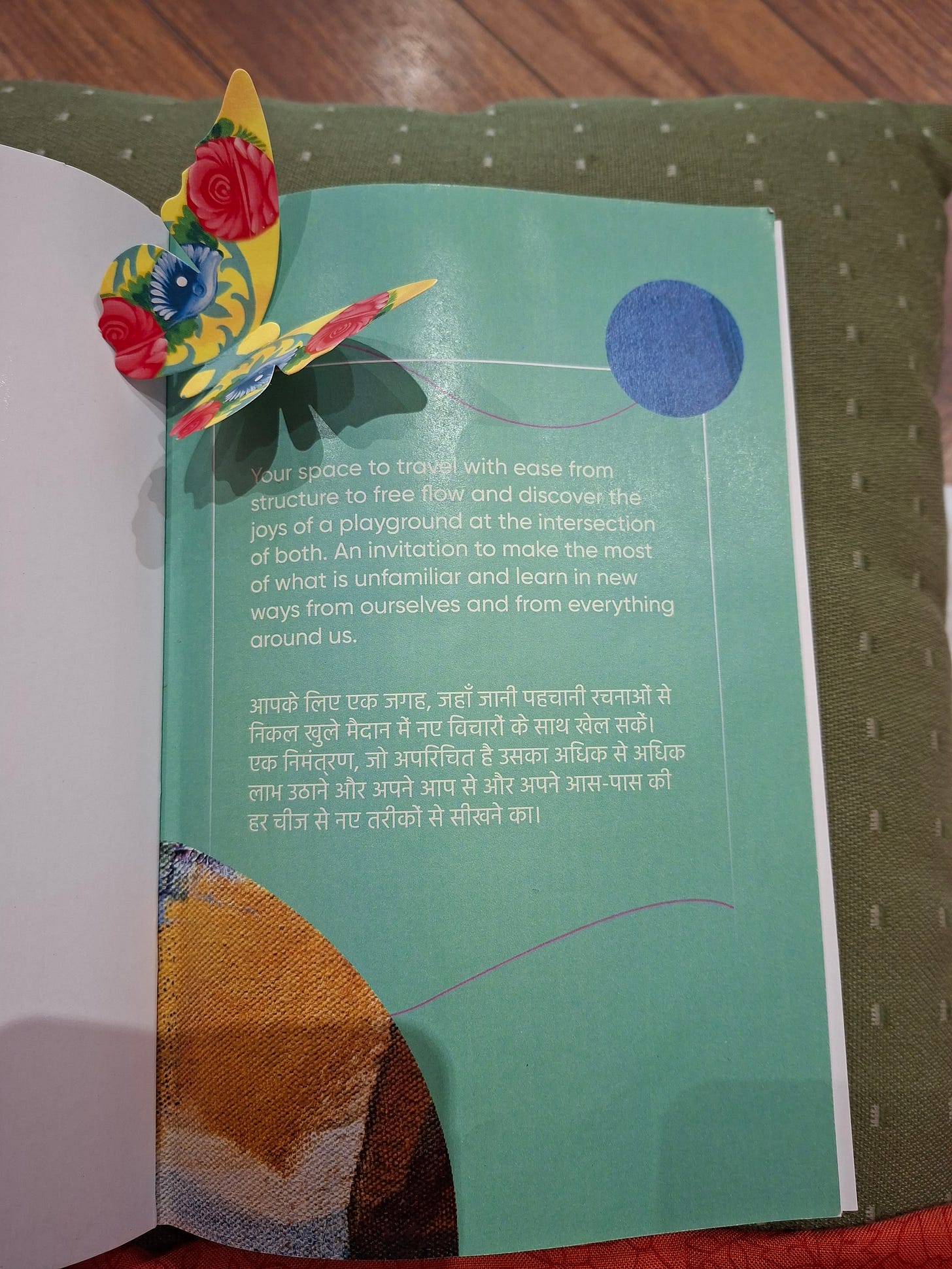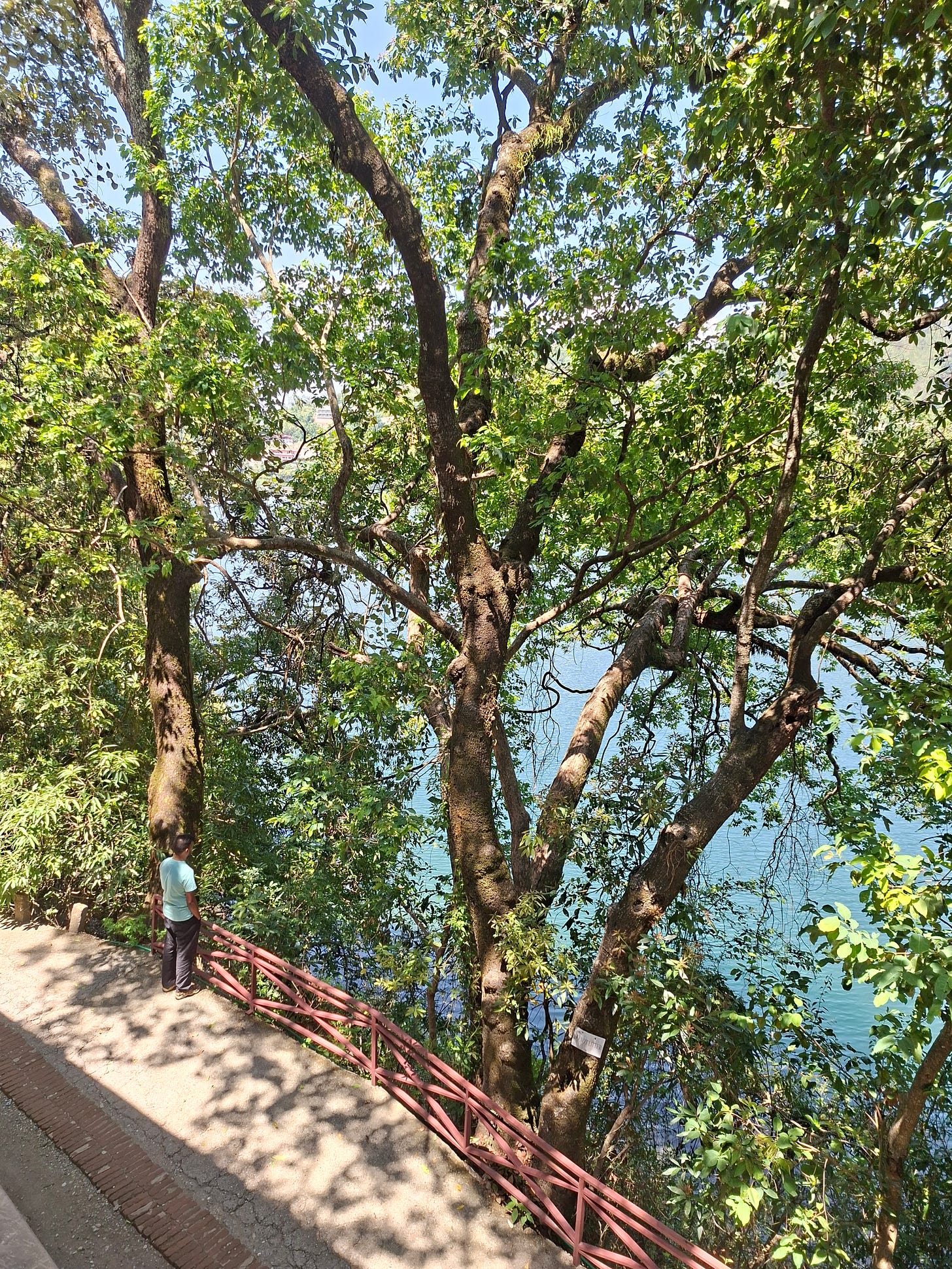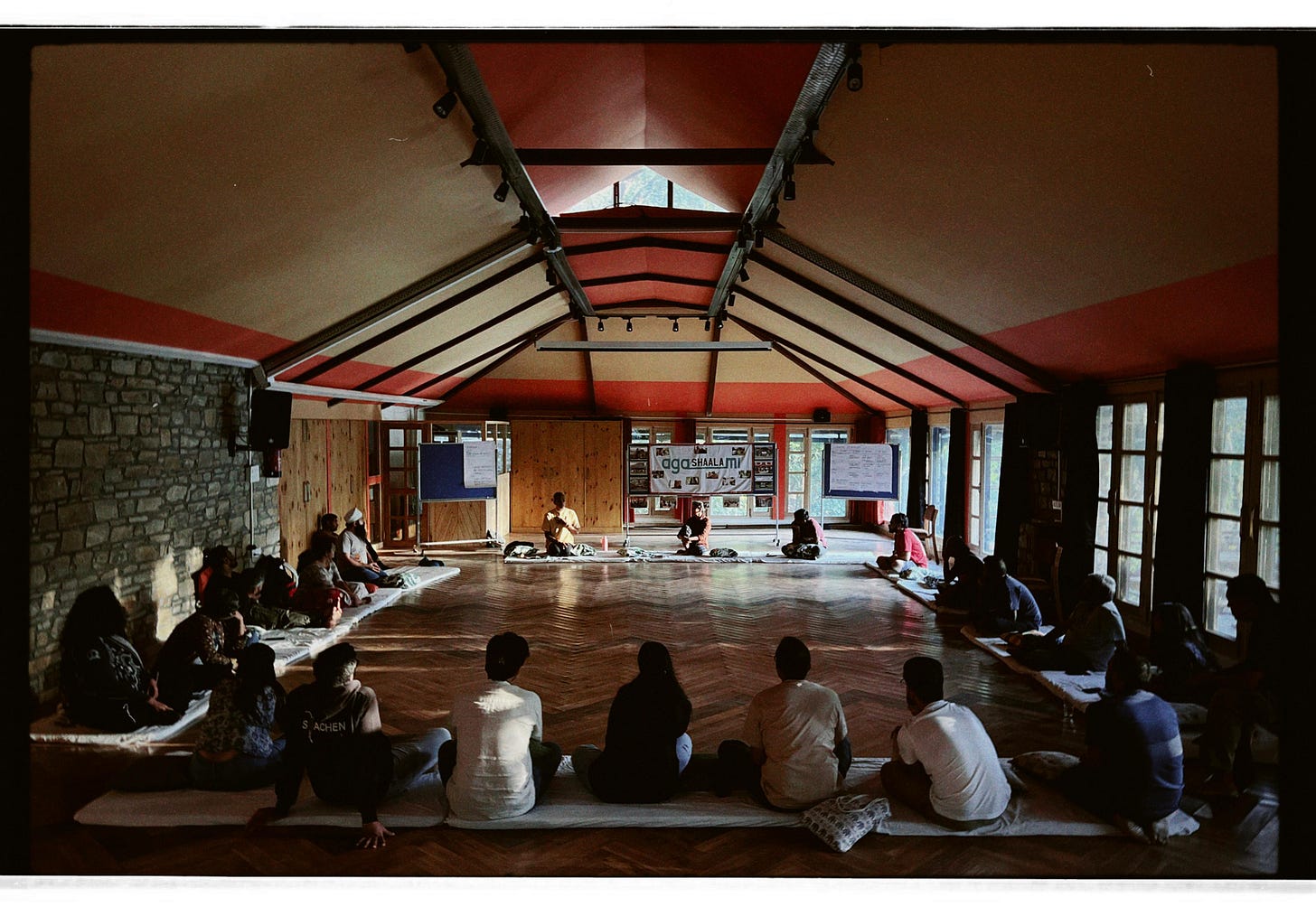Can we find courage in connection?
Abhidha Niphade, a member of the Agamishaala June'25 cohort, reflects on her experience
My journey to Agamishaala did not begin in the mountains of Uttarakhand. It began much earlier, in a quiet conversation with Aditi and Artika. I remember carrying with me a certain expectation that this would be an interview, an exchange where I would present my experiences, speak about my journey, and perhaps seek recognition for the work I had been doing.
As someone born and raised in rural India, I have often felt that opportunities to learn, pause, and connect are rare. While people in larger cities and institutions move within ecosystems rich in resources and exposure, our work in rural areas often feels lonely. The chance to meet peers working at scale, to listen to their struggles and successes, seemed like a faraway privilege. And so, when I first spoke to them, I held this mindset: this is my time to tell my story.
But during that conversation, one of them said something that shook me gently but firmly. They said, “You are coming to connect, regardless of the emotional and physical boundaries.” Those words stayed with me like a compass. They told me that this journey was not going to be about proving myself or narrating my work. It was going to be about opening myself to others, to the unknown, to the parts of myself I had kept hidden. That was the mindset shift I carried with me as I set out for Naukuchiyatal, Uttarakhand - the venue for the 2025 Agamishaala.
As the road climbed higher, I felt the landscape slowly quiet my mind, preparing me for the unknown that awaited. The 3-hour ride to the venue was taken along with other members in this year’s cohort. These were people whose passion for their causes was evident not only in their words but in the way they carried themselves. Many of them had been walking their paths for much longer than I. Their work was larger, more visible, more seasoned. Sitting among them, I felt a mix of admiration and intimidation. A part of me whispered, Do I belong here?
But what unfolded over those three days was not a display of credentials or hierarchies. Instead, it was a slow unravelling of walls. I began to feel something I can only describe as comfort in strangers. The kind of comfort that comes not from similarity, but from sincerity. Each person brought their own fire, their own wounds, their own stories and in sharing them openly, they created a circle where I, too, could sit and breathe.
When I look back at those four days of the Shaala today, I realise that my memories of it are not just in my mind. They are in my body. I work in rural Maharashtra, where I run a collective for women and girls called Aruna Education Foundation. Through the collective, we walk alongside women’s self-help groups and young girls, creating small but steady pathways to resilience, access to justice, health, and opportunities that might otherwise remain out of reach. It is deeply meaningful work, but it is also exhausting — full of struggles, and the quiet weight of responsibility. Perhaps that is why Agamishaala felt like more than a gathering; it felt like a rare pause, a chance to breathe, and to be held in the company of others walking their own demanding paths.
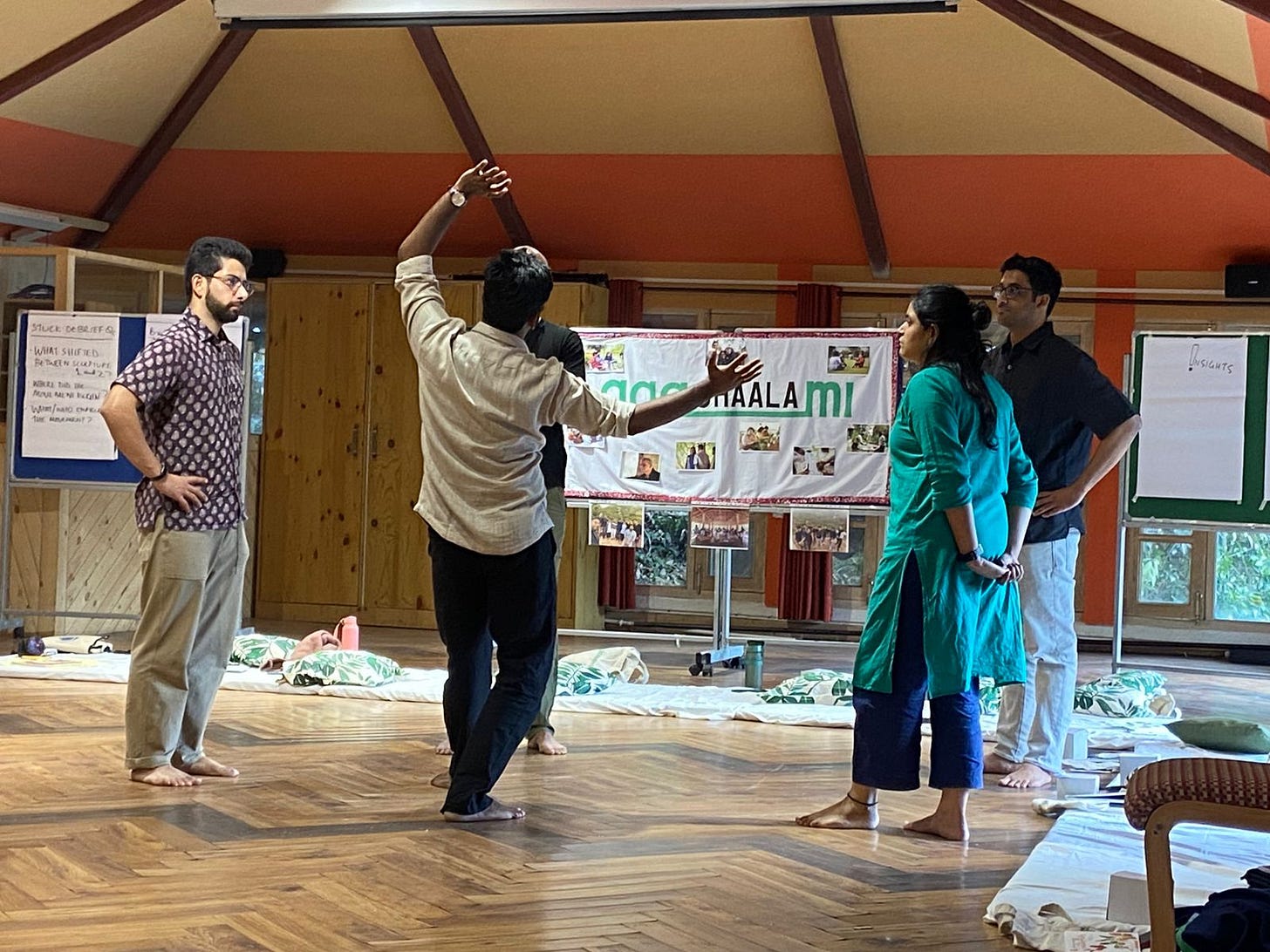
For the first time, I learnt to notice that my body had been speaking to me all along through exhaustion, through aches, through restlessness. For years, I had carried stress in my bones, but I never stopped to listen. During the three days, I realised that the body holds stories our mind refuses to tell. That our bodies often speak louder than our words. There were moments of stillness, of silence, where my body became my teacher. I learnt that the synchronisation of body and mind is not automatic; it is something to be learnt, practised, and nurtured. Agamishaala taught me to become aware of the parts of myself that were blocking openness, to soften into awareness, to face the emotions I had been suppressing.
This was not easy. It meant facing my sorrows, my patterns of reaction, my griefs that I had never acknowledged. It meant noticing how I respond to others’ pain, how my body holds stress when listening, and how it relaxes when held with care. Agamishaala became not just a space of external learning, but of internal atonement.
One of the most powerful practices at Agamishaala was open-heart sharing. Sitting in a circle, listening deeply, speaking honestly, these may sound like simple acts, but they carry immense power when done with trust. For me, these circles were transformative. They showed me that vulnerability is not weakness. In fact, it is the gateway to connection. When others shared their raw truths, I saw strength not in their victories but in their willingness to be seen in their fragility.
This shifted something in me. I had always thought that to be strong meant to be unshaken, to carry everything silently, to not reveal cracks. But Agamishaala taught me that true strength lies in saying, I am struggling. I am hurting. I don’t have all the answers. It is in those moments of raw honesty that we meet each other as humans, not as roles or titles.
Through this practice, I became aware of how my actions and words ripple into the lives of others. I realised that true connection is not about polite listening, but about holding space with presence and care. This came alive in the conversations that unfolded in our circles. Listening to Gyan, who shared his struggles, reminded me that strength is not the absence of pain but the capacity to adapt and keep walking. In Prabhat, I found someone who felt like a brother, a bond that cut across geographies and experiences, showing me that friendships can take root for life, regardless of age. My exchanges with Utkarsh and Nivedita left me reflecting on the power of the inner voice, how often we silence it, and how much courage it takes to truly listen.
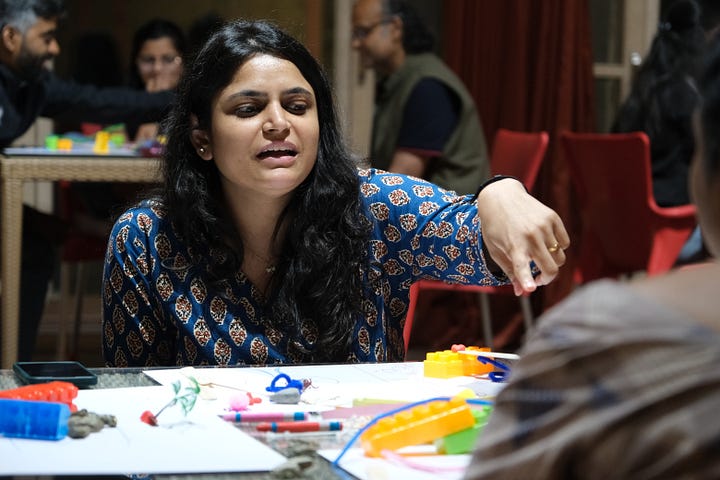
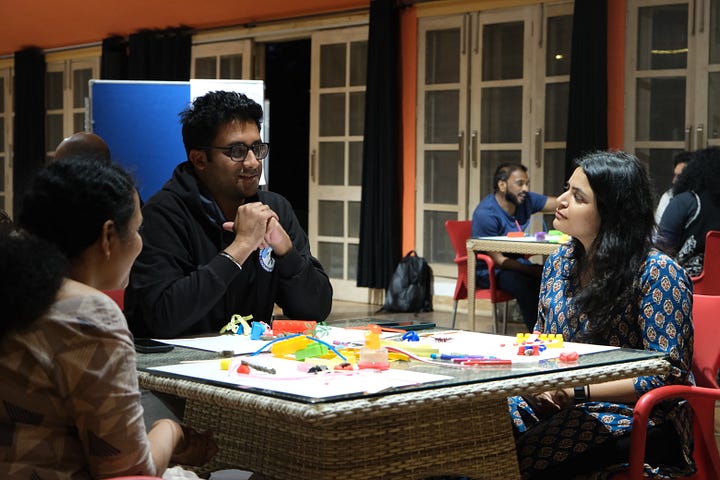
Each of these conversations became a mirror, revealing not only their journeys but also my own. They taught me that every story, when shared openly, ripples outward and reshapes those who receive it. These ripples continue into my work with ARUNA, where we create pathways to justice, resilience, and opportunity. Agamishaala has enabled me to show up differently: to hold space with more patience, to notice silences as much as words, and to encourage women not only to fight for rights but also to honour their own inner journeys of healing.
At first, I thought the magic of Agamishaala came from its location. After all, the mountains of Uttarakhand are breathtaking. The air feels lighter, the silence deeper, the trees older and wiser than us. But with time, I realised that while nature created a gentle container, the real transformation came from people. From the journeys of those who had moved from ego to eco from self-centeredness to collective consciousness. From their willingness to unlearn, to question, to hold contradictions without rushing to solve them.
Nature reminded me of stillness. People reminded me of courage. Together, they created a space where healing and transformation could happen.
It would be easy to romanticise Agamishaala as a beautiful retreat. But the truth is more complex. Yes, it was beautiful. Yes, it was thought-provoking. But it was also painful, raw, and confronting.
I remember Anuradha ji shared a line that has stayed with me ever since: “The wound is where the light enters the soul.” At first, it felt like poetry, but the more I sat with it, the more I understood its truth. Our wounds are not just scars of pain, they are openings, tender spaces where something new can enter. For so long, I had treated my wounds as weaknesses, as things to hide or heal quickly. But Agamishaala taught me to see them differently. To see that it is precisely in our brokenness, in our vulnerability, that we become open to light, to compassion, to transformation. That sentence became a mirror for me, reminding me that the parts of myself I wanted to cover up were actually the very places where growth and connection could begin.
There were moments when I had to face sorrows I had buried. Moments when I realised the stress I carried was not just temporary but had seeped into my very bones. Moments when listening to others’ stories shook me, challenged me, and made me question the narratives I had held.
And yet, within that pain lay the possibility of growth. Because growth is not always about comfort, often, it comes from discomfort, from staying present with what hurts, from allowing yourself to be reshaped by the encounter.
Agamishaala was not about giving answers. It was about opening questions - questions that stay with you, questions that refuse to be rushed, questions that invite you to live differently.
It has been two months since that experience, and I am still learning. The lessons did not end when I left Uttarakhand. They continue to unfold slowly, like seeds planted in soil, sprouting quietly in unexpected ways.
When I think of leadership, I realise how often we create invisible rules for ourselves. We are trained to appear strong, composed, and emotionally unshaken, because none of us wants to be seen as weak leaders. But the process made me question this notion. I began to see that true leadership is not about perfection or always having answers. It is about vulnerability, about allowing yourself to feel, to be open, and to let others see your humanness. That is how we connect, not from behind the fences we build, but from the courage to step outside them. Leadership, I learnt, is not about finding immediate answers to every problem. It is about holding questions long enough for deeper, more sustainable responses to emerge.
The biggest gift Agamishaala gave me was the courage to be vulnerable. The acceptance that it is okay not to have all the answers. The realisation that connection is not an afterthought, but the very ground of any meaningful work.
I carry forward the memory of sitting in circles, the echo of mountains holding our words, the feeling of my body finally being heard. I carry forward the reminder that my actions ripple into others’ lives. I carry forward the lesson that growth is not linear, not immediate, but a slow sinking in like rain into the earth.
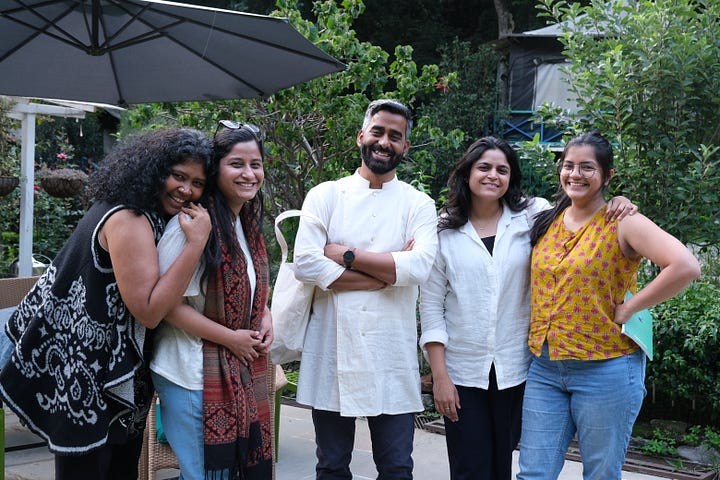
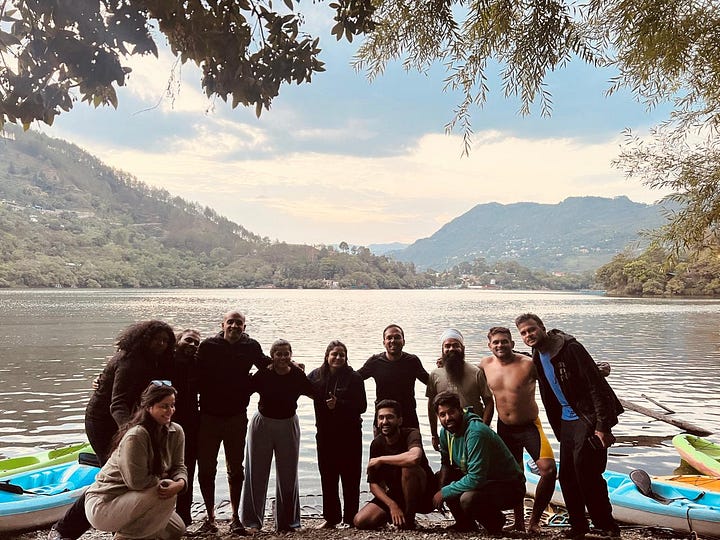
For me, Agamishaala transcended a workshop. It was a threshold, a crossing over from one way of being into another. It asked me to pause, to listen, to unlearn, to face what I had hidden, and to accept what I had denied. Most of all, it gave me something I did not even know I needed, at exactly the time I needed it. Perhaps that is the true gift of Agamishaala: it does not arrive as an answer, but as a gentle turning of the soul, reminding us that the journey of justice begins within.
In its essence, it is a community of people daring to imagine justice differently. For me, it also became something deeply personal, a mirror, a teacher, and a companion. It reminded me that the journey from ego to eco does not begin in grand ideas, but in the quiet courage to sit with yourself, and with others, with an open heart.
As I return to my work at Aruna, I carry these learnings not as abstract reflections but as living practices. The pause, the vulnerability, the courage to listen deeply, these are not only personal shifts, but tools that I now bring back to the women and girls I walk alongside. In our collective, where we create pathways to justice, resilience, and opportunity, I see how these lessons ripple outward. Agamishaala has enabled me to show up differently: to hold space with more patience, to notice silences as much as words, and to encourage women not just to fight for rights but also to honour their own inner journeys of healing.
In many ways, what I learnt in those circles in Uttarakhand mirrors the spirit of Aruna ie that true change emerges when we create spaces of trust, when we allow wounds to speak, and when we move from isolation to community. Just as Agamishaala reminded me that leadership begins with vulnerability, Aruna reminds me every day that justice is built not only through policy or advocacy, but through the quiet, consistent work of holding women’s hands as they step into their own strength. I see the bridge between Agamishaala and Aruna as this: both are communities of courage, both believe in the power of open hearts, and both are committed to reimagining justice from the ground up.
And alongside these learnings, I carry with me the friendships born at Agamishaala, bonds I will treasure for life, as reminders that our journeys are lighter and richer when walked together.
This is a guest post by Adv. Abhidha Niphade, a lawyer working closely with communities in rural Maharashtra to make justice and safety more accessible. Her own experiences pushed her to create spaces where women, children, and youth feel seen, heard, and supported. She is the Founder-Director of Aruna Education Foundation, which focuses on building everyday tools like legal literacy, social security, life skills, and emotional strength to help people navigate systems with dignity.
Abhidha can be reached at abhidhaniphadeindia@gmail



